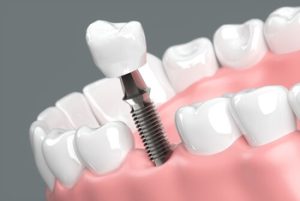Navigating the landscape of dental insurance, especially when it concerns dental implants, is crucial for maintaining excellent oral health and managing costs effectively. Dental insurance that covers implants plays a pivotal role in making essential dental care more accessible and affordable. Dental implants are a significant investment in one’s oral health, offering a permanent solution for missing teeth and helping to prevent the many issues that arise from tooth loss.
Understanding the coverage options available within your dental insurance can greatly influence your decision-making process and financial planning. Not all dental insurance plans cover implants, as they are often considered a major dental procedure. Therefore, identifying plans that do cover such treatments can relieve financial stress and contribute to better overall health outcomes.
Delving into Dental Insurance Coverage for Implants
General Coverage vs. Implant-Specific Coverage
Most standard dental insurance plans categorise treatments into preventive, basic, and major dental procedures. While routine cleanings and check-ups fall under preventive care, and fillings under basic care, dental implants typically fall under major dental procedures. It’s crucial to recognise that not all plans automatically cover major procedures. Therefore, specific coverage for dental implant procedures needs to be explicitly stated or included as a part of a comprehensive dental plan.
Understanding Implant Coverage
Insurance policies that cover dental implants specifically will often detail the extent of coverage, which could include the surgical placement of the implant, the abutment, and the crown. The policy might cover a percentage of the total cost or up to a certain amount, which helps manage the often substantial expense of implant procedures. It’s important to examine your policy for any clauses that pertain to waiting periods, as some insurers require policyholders to be enrolled in the plan for a certain amount of time before they can claim for implant coverage.
Checking Your Policy Details
To effectively navigate and maximise your dental insurance coverage for implants, it is essential to carefully read and understand your policy’s fine print. In some cases, you may find that while the initial surgical implant might be covered, certain aspects, like the final crown or specific advanced implant materials, may not be, depending on the policy specifics.
Consulting with Insurance Providers
If the details in your insurance documentation are unclear, directly consulting with your insurance provider can offer clarity. Asking targeted questions about what exactly is covered, under what conditions, and what percentages are paid out can demystify much of the ambiguity that often surrounds dental implant insurance.
Understanding the specific details of your dental insurance coverage for implants is crucial for making informed decisions about your oral health treatments. This knowledge not only helps in planning financially for necessary dental work but also ensures that you can undertake these important procedures with confidence, knowing that you are effectively covered.
Exploring Dental Insurance Plans that Cover Implants
Private Health Insurance with Dental Cover
Many private health insurance plans offer dental cover as an optional extra. These plans can be tailored to include major dental cover, which typically encompasses more complex procedures such as dental implants. It’s crucial to examine the specifics of what each plan covers, as some may offer partial coverage for implants while others might provide comprehensive benefits that cover the entire cost of the procedure.
Dental Insurance with Specific Implant Cover
Some dental insurance policies are designed to specifically cover dental implants. These plans are particularly beneficial for individuals who anticipate needing implants and are looking for insurance solutions that directly address this need. These plans might have higher premiums but often offset this cost by significantly reducing the out-of-pocket expenses for dental implant procedures.
Capitation Plans
Capitation plans are a type of dental insurance that operates under a payment structure where a dentist is paid a fixed amount per patient per month. While less common, some of these plans can include provisions for more extensive dental work, such as implants. However, it’s essential to confirm the extent of coverage provided for implants under these plans.
Employer-Sponsored Dental Benefits
For those employed with benefits packages, employer-sponsored dental insurance can sometimes include coverage for dental implants. These plans are part of an employee’s benefits package and can offer extensive cover, including for major dental procedures. Checking the specific terms of your employer’s plan can reveal whether dental implants are included and to what extent.
In all cases, when evaluating dental insurance plans, it’s important to read the fine print and directly consult with insurance providers to clarify any uncertainties about what is covered, especially regarding major dental procedures like implants. Understanding these details will help ensure that you choose a plan that best meets your needs and provides the necessary financial support for your dental care.
Understanding the Financial Aspects of Dental Implants with Insurance
Navigating the costs associated with dental implants can be complex, especially when considering how dental insurance coverage can mitigate these expenses.
Breakdown of Dental Implants Cost
Additional costs might arise from necessary procedures like dental bone grafts if the patient lacks sufficient bone density. Each of these elements contributes to the overall cost of dental implants, making them a significant investment.
Maximising Insurance Benefits
To maximise your dental insurance benefits, it’s crucial to plan your treatment according to your insurance’s annual limits and benefits reset. Scheduling procedures over two calendar years can sometimes allow you to use two annual maximums, thereby reducing your total out-of-pocket expenses.
Before proceeding with the treatment, obtaining a pre-treatment estimate from your dentist and submitting it to your insurance provider can give you a clearer idea of what costs will be covered and what you will need to pay out-of-pocket. This step is essential for financial planning and to avoid any surprises during the course of your dental implant treatment.
Exploring Alternative Funding Options for Dental Implants
When dental insurance does not fully cover the costs of dental implant treatment, exploring alternative funding options can provide the financial support needed to proceed with this major dental procedure. These alternatives can help manage the substantial expenses associated with dental implants, making the treatment more accessible.
Payment Plans Offered by Dental Clinics
Many dental clinics understand the financial burden that can come with extensive dental treatments and offer their own payment plans to patients. These plans often allow you to spread the cost of the treatment over several months or even years. Before committing to a payment plan, it’s crucial to understand the terms, such as any interest rates applied and the payment schedule, to ensure that it fits within your budget.
Dental Discount Programs
Dental discount programs are another viable option for managing the costs of dental implants. By paying an annual fee, these programs provide you access to a network of dentists who offer their services at reduced rates. These discounts can significantly lower the cost of each phase of the dental implant process, from the surgical placement to the final restoration.
Medical Credit Cards
For those seeking a flexible way to handle medical expenses, medical credit cards are specifically designed for health care services, including dental procedures. These cards often offer promotional periods with zero or low interest. However, it’s important to pay off the balance before the promotional period ends to avoid high interest rates.
These alternatives require careful consideration to ensure they align with your financial situation and health care needs. By thoroughly exploring these options, individuals can find a viable way to fund their dental implant treatment without overextending their finances, ensuring they can proceed with this important investment in their oral health.
Secure Your Dental Future with the Right Coverage
Note: Any surgical or invasive procedure carries risks. Before proceeding, you should seek a second opinion from an appropriately qualified health practitioner.
References:
https://www.mayoclinic.org/tests-procedures/dental-implant-surgery/about/pac-20384622
https://www.healthdirect.gov.au/dental-implant



